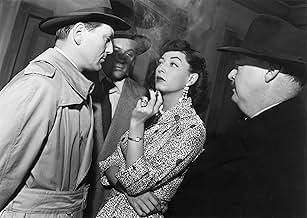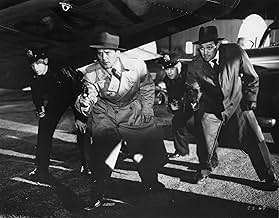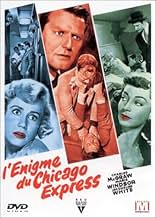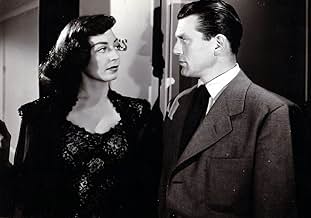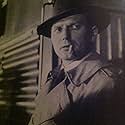IMDb-BEWERTUNG
7,6/10
9441
IHRE BEWERTUNG
Eine Frau, die gegen den Mob aussagen will, muss auf der Zugfahrt von Chicago nach Los Angeles vor ihren Attentätern geschützt werden.Eine Frau, die gegen den Mob aussagen will, muss auf der Zugfahrt von Chicago nach Los Angeles vor ihren Attentätern geschützt werden.Eine Frau, die gegen den Mob aussagen will, muss auf der Zugfahrt von Chicago nach Los Angeles vor ihren Attentätern geschützt werden.
- Regie
- Drehbuch
- Hauptbesetzung
- Für 1 Oscar nominiert
- 1 Nominierung insgesamt
Peter Brocco
- Vincent Yost
- (Nicht genannt)
Ivan Browning
- Waiter
- (Nicht genannt)
George Chandler
- Accomplice Running Newsstand
- (Nicht genannt)
James Conaty
- Tenant in Apartment House Hallway
- (Nicht genannt)
Don Dillaway
- Reporter
- (Nicht genannt)
Franklyn Farnum
- Train Passenger
- (Nicht genannt)
Bess Flowers
- Wagon Restaurant Diner
- (Nicht genannt)
Don Haggerty
- Det. Wilson
- (Nicht genannt)
Empfohlene Bewertungen
I'm a huge Charles McGraw fan. Every film he had a large part in, he excels and makes the film better.
Having seen this film 4 or 5 times, my respect for it has grown over the years.
The cinematography isn't perfect - the film probably could have benefited by staying dark and grainy as it seems to be in the early, night scenes.
The taut train scenes seem too bright, but there's nothing wrong with it, simply my preference. A darker train would have made for a more sinister film. Even so, there's plenty of excitement.
The crackling dialogue between Charles McGraw and Marie Windsor is consistently sharp. Seriously, you will have a hard time finding anything more bitter than those two. I'm not sure any other male-female could have made the dialogue (which in a 1950's way is almost corny) come off so terse, as they continuously bark at each other. Someone needs to count the number of times McGraw tells Windsor to "Shut up!".
The film has some exciting twists and turns; you'll enjoy each one.
Great story, solid performances all the way around. This is a FUN movie.
Having seen this film 4 or 5 times, my respect for it has grown over the years.
The cinematography isn't perfect - the film probably could have benefited by staying dark and grainy as it seems to be in the early, night scenes.
The taut train scenes seem too bright, but there's nothing wrong with it, simply my preference. A darker train would have made for a more sinister film. Even so, there's plenty of excitement.
The crackling dialogue between Charles McGraw and Marie Windsor is consistently sharp. Seriously, you will have a hard time finding anything more bitter than those two. I'm not sure any other male-female could have made the dialogue (which in a 1950's way is almost corny) come off so terse, as they continuously bark at each other. Someone needs to count the number of times McGraw tells Windsor to "Shut up!".
The film has some exciting twists and turns; you'll enjoy each one.
Great story, solid performances all the way around. This is a FUN movie.
The Narrow Margin is excellent. It's too bad more of our new directors have forgotten how to make a great film with a minimal budget, using instead inventive camera angles, good characters and dialog, and some surprises along the way. I really loved Marie Windsor as the mobster's wife who's going to LA to sing to the Grand Jury. She's one of the toughest broads I've ever seen! Charles McGraw does his standard tough cop role and turns in a performance that sets the standard by which all others are judged.
This is the original, and beats the heck out of the re-make.....
This is the original, and beats the heck out of the re-make.....
This was the "original" and, like its re-make "Narrow Margin" (the "The" is missing), it is excellent. This is one of those rare cases in which the old and the new versions both are top-notch.
In fact, it's interesting to compare the two versions. In this film, there is a very unique twist as the end concerning the woman being brought to Los Angeles. It was clever.
That woman in this 1952 version also is played by perhaps the First Lady Of Noir, Marie Windsor. She had the best lines in the film and is outstanding at playing the tough-talking moll of this genre. (See Stanley Kubrick's "The Killing" to fully appreciate more of Windsor's work.)
The film noir tough-guy male equivalent of her also stars in this film: Charles McGraw. Few guys ever looked and sounded better in noirs than McGraw. He and Windor were born to play in 'B' crime movies!
The short length of this film makes it a good one to watch anytime although, to be frank, if I could only own one of the two "Narrow Margin" films, I'd have to take the latter-day version with Gene Hackman and Anne Archer, but it would a tough decision. Both have a lot to offer.
In fact, it's interesting to compare the two versions. In this film, there is a very unique twist as the end concerning the woman being brought to Los Angeles. It was clever.
That woman in this 1952 version also is played by perhaps the First Lady Of Noir, Marie Windsor. She had the best lines in the film and is outstanding at playing the tough-talking moll of this genre. (See Stanley Kubrick's "The Killing" to fully appreciate more of Windsor's work.)
The film noir tough-guy male equivalent of her also stars in this film: Charles McGraw. Few guys ever looked and sounded better in noirs than McGraw. He and Windor were born to play in 'B' crime movies!
The short length of this film makes it a good one to watch anytime although, to be frank, if I could only own one of the two "Narrow Margin" films, I'd have to take the latter-day version with Gene Hackman and Anne Archer, but it would a tough decision. Both have a lot to offer.
Charles McGraw plays edgy cop Walter Brown. His job is to protect a dead racketeer's wife, Mrs Neil (Marie Windsor) from the mob. She's a key witness in a grand jury probe, and also has a payoff list linking gang members to the LAPD. Most of the film's action takes place on board the train taking Brown and Neil to Los Angeles, where she will testify.In Mrs. Neil, played to perfection by Windsor, the queen of B movies, the tough talking, wise-cracking Brown meets his match. On the way to meet her, he glibly tells his partner, Gus Forbes that "She's the sixty cent special. Cheap. Flashy. Sticky poison under the gravy." When he and Forbes, both from Los Angeles, first meet her, she says, "How nice. How Los Angeles." Then looking Brown up and down, she snarls, "Sunburn wear off on the way?" My favorite wisecrack occurs after Brown has finally had enough of her wise remarks and lashes out, "You make me sick to my stomach." Her retaliation is a gem: "Well, use your own sink." Unlike the banter between Nick and Noira Charles of The Thin Man series, there's nothing the least sophisticated about the way Brown and Neil talk each other. Director Richard Fleischer uses inventive camera work, the sounds of the train rather than a music score, and the train's claustrophobic atomsphere to create and sustain tension. An RKO picture, The Narrow Margin is an unpretentious, taut low-budget thriller, a minor classic far superior to the 1990 Gene Hackman-Anne Archer remake.
While director Richard Fleischer gets plenty of credit for his role in making the film noir classic "The Narrow Margin" on a shoestring budget, it is hard to imagine this picture without actor Charles McGraw in the lead role. As a tough cop escorting a witness to testify in Los Angeles, McGraw's performance is what holds the picture together. Try to think now of one actor around today who could portray a cop who is at times calculating, other times sarcastic and almost always menacing. In the Hollywood of the 1940s and 50s,Charles McGraw usually played secondary roles in A pictures. In "The Narrow Margin," McGraw shows that with a competent director, he could put on some performance as the star of a movie.
Wusstest du schon
- WissenswertesIn preference to removing various walls from the sets, director Richard Fleischer decided to make extensive use of a handheld camera that could be brought into rooms; this was one of the first films to do so. To save money, the train sets were rigidly fixed to the floor and the camera was moved to simulate the train rocking.
- PatzerThere are palm trees at the Denver train station.
- Zitate
Walter Brown: Pardon me, I'd like to get through.
Jennings: Sorry, this train wasn't designed for my tonnage, heh. Nobody loves a fat man except his grocer and his tailor!
- Alternative VersionenAlso available in a computer colorized version.
- VerbindungenFeatured in Hollywood the Golden Years: The RKO Story: Howard's Way (1987)
Top-Auswahl
Melde dich zum Bewerten an und greife auf die Watchlist für personalisierte Empfehlungen zu.
- How long is The Narrow Margin?Powered by Alexa
Details
Box Office
- Budget
- 188.000 $ (geschätzt)
- Laufzeit
- 1 Std. 11 Min.(71 min)
- Farbe
- Seitenverhältnis
- 1.37 : 1
Zu dieser Seite beitragen
Bearbeitung vorschlagen oder fehlenden Inhalt hinzufügen


